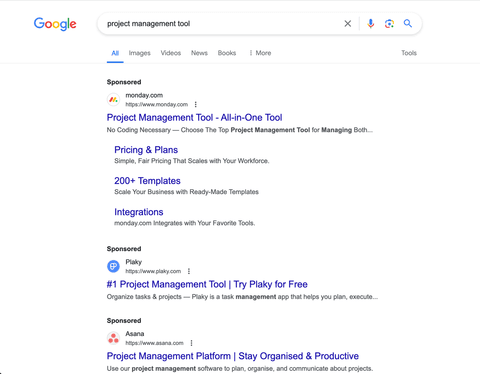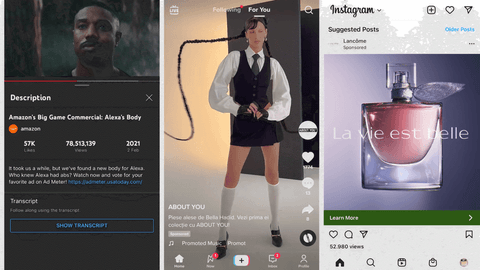NEWS ALERT - We won a SILVER IPM award for Best use of Social Media, 2025! Read more🏆

In a world where scrolling is the new strolling and clicks are the currency of choice, it’s clear that we’re living in the digital age. With 5.35 billion internet users worldwide, the digital world is the place for brands to get in front of their audience. But don’t worry we’re going beyond the memes and cat videos to discuss exactly what digital advertising is and covering the basics that you need to know.
Digital advertising at its core refers to advertising online through digital channels like social media, search engines, websites and mobile apps. It’s all about spreading your message and reaching your audience in the one place a lot of us spend most of our time - the internet.
From display ads to video ads, sponsored content to email marketing, there is a wide range of online advertising to explore. Understanding your audience and campaign goals is the key to selecting the right placement for your advertising. Let’s take a deeper look at how it all works.
The idea of digital advertising is simple: target the right audience, deliver your message effectively and track the results. It’s all about reaching the people who are most likely to be interested in your products or services. This involves selecting the right ad formats and placements across different digital channels. Additionally, digital advertising relies on bidding models, where advertisers compete for ad space based on factors like keywords and audience targeting. Once ads are live, tracking methods allow advertisers to monitor performance metrics like clicks, impressions, and conversions, providing valuable insights for optimising future campaigns.
If you’re looking for more platform-specific advice you can find more in-depth blogs covering different channels on our blog.
What does digital advertising offer brands? A whole range of advantages that make it a powerful tool for businesses of all sizes:
Its reach knows no bounds! Digital advertising allows you to connect with a global audience or narrow down to a specific demographic with precision targeting. This targeting capability ensures that your message reaches those most likely to engage with it.
Measurability. This is one of its greatest strengths, unlike traditional advertising methods, digital ads provide detailed analytics that allows you to track key performance indicators in real-time. From clicks and impressions to conversions and ROI, these metrics are in the palm of your hands within seconds and allow you to test and tweak your ads whenever you want.
Cost-Effective. Advertising online saves you time and money because you can see your reports in real-time. You can add more or pull back on campaigns based on findings before wasting money. You can scale up or down how much your brand wants to spend online based on your goals and reports quickly and easily.
When thinking about digital advertising it's important to also think about the variety of strategies that brands can use to achieve their specific objectives.
Search Engine Marketing (SEM) is used to focus on increasing visibility and driving traffic through search engine results pages for people who are actively looking for the brand or for words that match the business keywords based around them, their services or products. For example, If you were looking for a new project management tool you would type this into your search engine of choice and you will see the top results have sponsored above them, these are ads. These companies are using SEM as a marketing strategy to capture people who are searching keywords related to their product or brand.

Display advertising involves the placement of visual ads on websites, apps, or social media platforms to enhance brand visibility and reach. Have you ever been searching the internet for clothes and then gone to check the weather to find an ad at the corner of the page showcasing the same clothes you were just looking at? Yes, we’ve all been there. That placement of the ad is known as a display ad, the strategy behind is that they are also retargeting you to make sure you don’t forget about those clothes and bring you back to book it. This is just one example of how you could effectively use display ads to increase conversions.

Social media advertising leverages platforms like Facebook, Instagram, Twitter and LinkedIn to engage with target audiences through sponsored posts, stories and videos. These ads will interrupt the normal scroll of the feed and have strong call-to-actions to make you come away from what you were doing and find out more about the brand or product.
Video advertising capitalises on the popularity of video content, delivering engaging messages through platforms like YouTub, TikTok and Reels. These videos can be used in paid media across channels. Video is a great way to engage an audience and sometimes is a better way to explain a message, brand or product compared to a static image.

Remarketing and retargeting tactics are essential components of digital advertising strategies. Retargeting primarily uses paid ads across platforms to re-engage audiences who have visited your website or social profiles. Whereas remarketing, primarily uses email to re-engage past customers who have already done business with your brand. By strategically implementing both techniques, businesses can effectively target and engage with their audience across various digital channels, ultimately driving conversions and maximising the effectiveness of their digital advertising efforts.
Navigating the digital advertising landscape requires a solid grasp of best practices. We’ve put together a few pointers for you to implement into your digital strategies to ensure best practice.
Setting clear objectives and audience targeting: By understanding your goals and who you're trying to reach, you can tailor your messaging and tactics accordingly. Whether it's increasing brand awareness, driving website traffic, or boosting sales, having well-defined objectives lays the foundation for a successful campaign.
Crafting Compelling Ad Content: In the crowded digital world, captivating your audience's attention is paramount. On average we see around 10,000 ads for different businesses every single day so the key is to craft compelling ad content that cuts through the noise and resonates with your target audience. From eye-catching visuals to persuasive copy, you need to make your audience stop and look at your brand.
Optimising Campaigns and Analysing Performance: Digital advertising is an iterative process that requires constant optimisation and analysis. By leveraging data-driven insights to fine-tune campaigns in real-time you can ensure maximum performance and ROI. By closely monitoring key metrics and analysing performance trends, you will be able to make informed decisions that drive continuous improvement and success.
Ready to harness the power of digital advertising? We’ve provided a comprehensive overview of key strategies and best practices, so now you should know ‘what is digital advertising?’. But if you're ready to kickstart your digital campaign or need expert guidance, get in touch with us today. Let's turn your digital goals into reality!
_______
Sources:
SEM: Screenshot from Google
Display advertising: https://poweradspy.com/banner-...
Video advertising: https://socialbee.com/blog/vid...